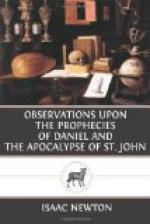who within thirty years after John’s
death became a Christian, writes expresly that
a certain man among the Christians_ whose name
was John, one of the twelve Apostles of Christ,
in the Revelation which was shewed him, prophesied
that those who believed in Christ should live
a thousand years at Jerusalem_. And a
few lines before he saith: But I, and as many
as are Christians_, in all things right in their
opinions, believe both that there shall be a resurrection
of the flesh, and a thousand years life at Jerusalem
built, adorned and enlarged_. Which is as much
as to say, that all true Christians in that
early age received this Prophecy: for in all
ages, as many as believed the thousand years, received
the Apocalypse as the foundation of their opinion:
and I do not know one instance to the contrary. Papias
Bishop of Hierapolis, a man of the Apostolic
age, and one of John’s own disciples,
did not only teach the doctrine of the thousand years,
but also [37] asserted the Apocalypse as written
by divine inspiration. Melito, who flourished
next after Justin, [38] wrote a commentary
upon this Prophecy; and he, being Bishop of Sardis
one of the seven Churches, could neither be ignorant
of their tradition about it, nor impose upon them.
Irenaeus, who was contemporary with Melito,
wrote much upon it, and said, that the number 666
was in all the antient and approved copies; and that
he had it also confirmed to him by those who had seen
John_ face to face_, meaning no doubt his master
Polycarp for one. At the same time [39]
Theophilus Bishop of Antioch asserted
it, and so did Tertullian, Clemens Alexandrinus,
and Origen soon after; and their contemporary
Hippolytus the Martyr, Metropolitan of the
Arabians, [40] wrote a commentary upon it.
All these were antient men, flourishing within a hundred
and twenty years after John’s death, and
of greatest note in the Churches of those times.
Soon after did Victorinus Pictaviensis write
another commentary upon it; and he lived in the time
of Dioclesian. This may surely suffice
to shew how the Apocalypse was received and
studied in the first ages: and I do not indeed
find any other book of the New Testament so strongly
attested, or commented upon so early as this.
The Prophecy said: Blessed is he that readeth,
and they that hear the words of this Prophecy, and
keep the things which are written therein. This
animated the first Christians to study it so
much, till the difficulty made them remit, and comment
more upon the other books of the New Testament.
This was the state of the Apocalypse, till the
thousand years being misunderstood, brought a prejudice
against it: and Dionysius of Alexandria,
noting how it abounded with barbarisms, that is with
Hebraisms, promoted that prejudice so far, as
to cause many Greeks in the fourth century
to doubt of the book. But whilst the Latins,
and a great part of the Greeks, always retained
the Apocalypse, and the rest doubted only out
of prejudice, it makes nothing against its authority.




